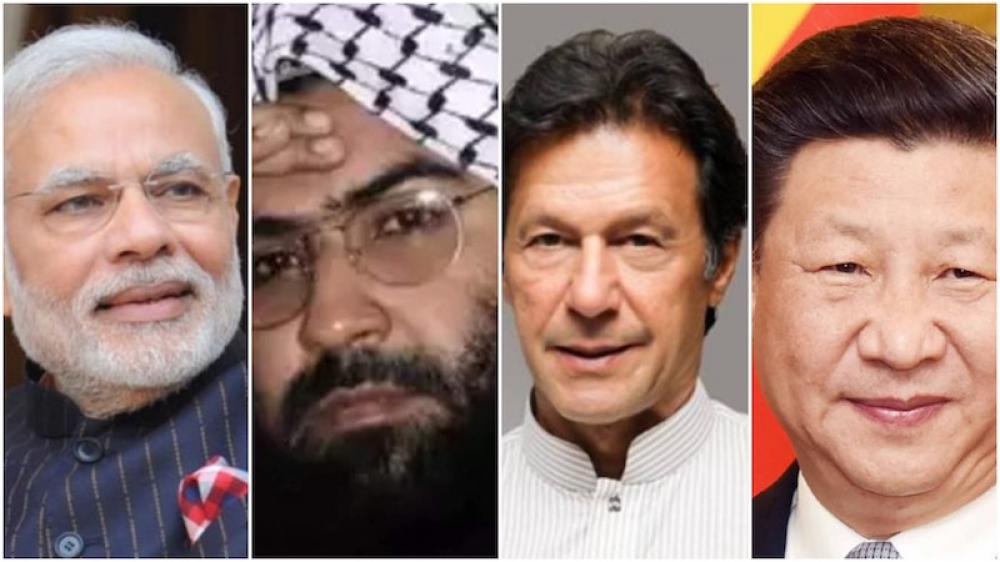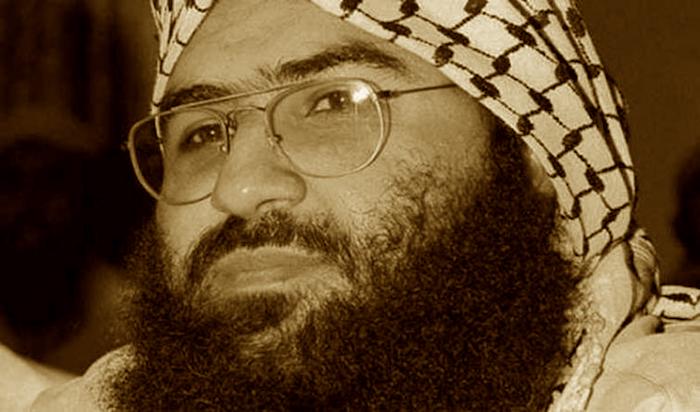Just Earth News | @justearthnews | 02 May 2019

In a major diplomatic victory for India battling cross-border terrorism, the United Nations Security Council (UNSC) finally designated Jaish-e-Mohammed [JeM] chief and notorious terrorist Masood Azhar as a global terrorist after China finally lifted its technical hold to blacklist him under the Security Council’s Sanctions Committee.
Here is a lowdown of the big development:
Who is Masood Azhar?
The blue-eyed boy of Pakistan’s spy agency ISI, who formed the JeM in 2000, had masterminded several terror/suicide attacks on India that includes the 2001 Parliament Attack and the recent Pulwama bombing in February which led to the death of over 40 Indian soldiers; both incidents had pushed India and Pakistan to the brink of a full-blown war.
His Jaish-e-Mohammed was also behind the Pathankot attack in Jan 2016, killing seven Indian soldiers.
Interestingly, Azhar's dreaded Jaish-e-Mohammed (JeM) was formed in March 2000 to target India by exporting terrorism to Kashmir just a few months after he was freed from an Indian prison in exchange of the hostages of the Indian Airlines flight IC-814 hijacked on Dec 24, 1999 by the Pakistani terrorist group Harkat-ul-Mujahideen from Nepal and flown to several locations before landing in Kandahar in Afghanistan.
The proposal to designate Azhar under the 1267 Al Qaeda Sanctions Committee of the UN Security Council was moved by France, The UK, and the US on February 27.
Big win for India!
— Geeta Mohan ???? ???? ???? ???? (@Geeta_Mohan) May 1, 2019
Indian envoy to UN @AkbaruddinIndia announced the designation of #MasoodAzhar and thanked all those nations that supported New Delhi in making this happen.#MasoodAzharBanned@IndiaToday @IndiaUNNewYork @SushmaSwaraj @MEAIndia @PMOIndia pic.twitter.com/SMCxbkWXeS
What does the latest move mean for India battling Pak-sponsored terrorism?
The listing is a victory for India in a decade-old diplomatic battle waged primarily by it and supported by its friends at the UNSC, as it would mean a travel ban, arms embargo, and asset freeze on Azhar.
This diplomatic victory also translates into a diplomatic surrender for China which has for years blocked his entry into the UN sanctions list for global terrorists.
As recently as in March, China had blocked Azhar’s entry into the UN sanctions list despite global outrage and pressure in the aftermath of the Pulwama terror attack which led to an escalating diplomatic pressure by India and members of the United Nations Security Council (UNSC).
A few days ago the US, The UK, and France had launched another fresh resolution to proscribe the JeM chief as a global terrorist which also included a scathing attack against China for assuming double standards on terrorism by US Secretary of State Mike Pompeo.
The pressure on China to revoke its technical hold on the sanction intensified after diplomats of the aforementioned nations threatened to place the issue for a vote in front of the entire UNSC.
This relentless diplomatic pressure was enough for China to buckle and it incidentally comes on the day Pakistan Prime Minister Imran Khan returned back from a visit to the nation.
The development also came as a boost to Prime Minister Narendra Modi's foreign policy in the ongoing election season.
Indian Finance Minister Arun Jaitley tweeted: "India stands vindicated. Masood Azhar is now a global terrorist. India is in safe hands. This marks a high point for the Prime Minister’s foreign policy."
India stands vindicated. Masood Azhar is now a global terrorist. India is in safe hands. This marks a high point for the Prime Minister’s foreign policy.
— Chowkidar Arun Jaitley (@arunjaitley) May 1, 2019
Syed Akbaruddin, India's permanent envoy to the UN, immediately tweeted: "Big, small, all join together. Masood Azhar designated as a terrorist in @UN Sanctions list Grateful to all for their support."
Big,small, all join together.
— Syed Akbaruddin (@AkbaruddinIndia) May 1, 2019
Masood Azhar designated as a terrorist in @UN Sanctions list
Grateful to all for their support. ????????#Zerotolerance4Terrorism
In a nutshell, India stands vindicated on its unending diplomatic tirade to corner Pakistan over the issue of terrorism and the action by China also is an indication of India's moral victory over its giant and more powerful neighbour which is a close ally of Pakistan.
In the wake of the Sri Lankan terror attacks, the move also perhaps salvaged China to a great extent as it was getting increasingly isolated on its silence over Pakistan sponsored terrorism while at the same time harbouring the ambition to control the entire world economically.
Past diplomatic hurdles
China had put a hold in March on a fresh proposal by the P-3 or group of three permanent UNSC members, the U.S., the U.K., and France, to impose a ban on the chief of the JeM which claimed responsibility for the deadly Pulwama terror attack. The proposal was the fourth such bid at the UN in the last 10 years to list Azhar as a global terrorist.
In 2009, India had moved a proposal to designate Azhar as a "global terrorist".
In 2016 again India moved the proposal with the P3 in the UN's 1267 Sanctions Committee to ban Azhar, also the mastermind of the attack on the Pathankot air base that year.
In 2017, the P3 nations moved a similar proposal again.
However, on all occasions China, a veto-wielding permanent member of the Security Council, blocked India's proposal from being adopted by the Sanctions Committee.
Reasons for listing
The reasons for designating Azhar as a terrorist as per Wednesday’s listing included his support for the JeM since its founding, being associated with the al-Qaeda by recruiting for them and “participating in the financing, planning, facilitating, preparing, or perpetrating of acts or activities or supplying, selling or transferring arms and related material”. It also pointed to his role in recruiting fighters in Afghanistan, while the JeM itself was sanctioned by the 1267 Committee in 2001.
What it means for Masood Azhar?
A UNSC designation will subject Azhar to an assets freeze, travel ban and an arms embargo.
It freezes all his assets under the Sanctions Committee requires that all states freeze without delay the funds and other financial assets or economic resources of designated individuals and entities.

The travel ban entails preventing the entry into or transit by all states through their territories by designated individuals.
Under the arms embargo, all states are required to prevent the direct or indirect supply, sale, and transfer from their territories or by their nationals outside their territories, or using their flag vessels or aircraft, of arms and related materiel of all types, spare parts, and technical advice, assistance, or training related to military activities, to designated individuals and entities.
Improved international ties and Modi's foreign policy
It is another feather in Prime Minister Narendra Modi’s cap as the aggressive foreign policy he has pursued against terror during his term has yielded fruitful result.
The listing was a result of diplomacy by many partners and took concerns from all countries on board.
France had been extremely supportive of India and the US under Donald Trump has been conducive to Indian interests as well as he tries to corner China with India’s help.
France, the UK and USA had pushed the UN Security Council to declare Azhar as a global terrorist while Indonesia played an important role as the Chairperson of the UN Security Council.
U.N. decision in line with our position: MEA
Welcoming the decision, which India called it a “step in the right direction”, the Ministry of External Affairs (MEA) said it had demonstrated the international community’s resolve to fight against terrorism and “its enablers”.
“This is in accordance with India’s position and in line with the information that India has shared with the members of the Sanctions Committee regarding terrorist activities of Masood Azhar and the JeM. India will continue with its efforts through international forums to ensure that terrorist organisations and their leaders who cause harm to our citizens are brought to justice” said Raveesh Kumar, Ministry of External Affairs (MEA) spokesperson.
Pakistan’s dilemma
Pakistan is now in a state of dilemma on what to do about with anti-India militants on its soil after China - a long-time ally of Pakistan - finally enabled the global action against Masood Azhar.
Pakistan, which had strongly prevented a ban against Masood Azhar, has been accused of shielding terror mastermind on several occasions. However, the fresh UN listing changes the picture altogether as Pakistan will have to immediately enforce the UN sanctions on Azhar.
The Pakistani said it would immediately enforce the sanctions, but also took aim at India.
"Pakistan maintains that terrorism is a menace to the world, including the Indian state-sponsored terrorism against innocent Kashmiris," foreign office spokesman Mohammad Faisal said.
The activities of these militant groups seem to be an obstacle to Prime Minister Imran Khan's stated aim of improving the country's relationship with India, and perhaps more crucially they have also contributed to Pakistan being placed on the Financial Action Task Force (FATF) "grey list" for not doing enough to tackle the financing of militant organisations.
A "grey list" designation can make international businesses think twice before conducting business in a country, and Pakistan's economy is in need of foreign investment.
Pakistani officials, however, have expressed concern that directly confronting JeM could provoke another spike in violence.
Last year, analysts and Pakistani military figures floated the idea of "mainstreaming" some of those linked to militant group
The India-China-Pakistan triangle
The India-China-Pakistan triangle is one of the most volatile and dangerous strategic formations. The three powers account for nearly half the world’s population. They are respectively the second, first, and sixth largest countries in population terms.
In the general view, Islamic Pakistan’s all-weather-friend Communist China had always allied against India.
The deterioration of India-China relations since 2014 and the strengthening of China-Pakistan relations have put India in a difficult strategic spot. But with the recent international developments, south-east Asia might witness a new wave of international politics.